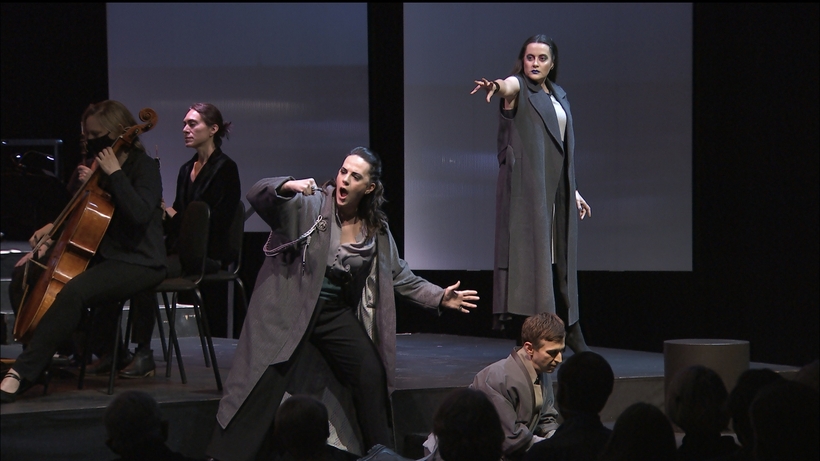Circe, Alcina, Armida … The witch who commands the elements yet cannot bind the man she loves has gone by many names. In Amadigi di Gaula, an earlyish opera from George Frideric Handel’s three-decade London period, she returns as Melissa, working her wiles on the eponymous wandering knight. His heart, though, is set on Oriana, a princess Melissa has locked away, Rapunzel-style, in a tower. Rounding out the cast, there’s Amadigi’s buddy Dardano, Amadigi’s secret rival for Oriana. Now sit back and watch Handel turn the kaleidoscope from heartbreak to fury in arias and a duet or two of surpassing beauty, all orchestrated with imagination nothing short of sublime.
In a program note to last month’s rare revival by Boston Baroque, the ensemble’s music director Martin Pearlman quotes a review of the premiere production in the 18th-century news sheet The Daily Courant, evoking mechanical effects so elaborate that no one, not even “subscribers” (the entitled fat-cat boxholders who kept the opera house afloat), could be permitted onstage for fear of grievous bodily harm. The eminent British composer and historian Charles Burney is heard from too, recalling “more invention, variety, and good composition than in any one of the musical dramas of Handel which I have yet carefully and critically examined.” How to account for Amadigi’s neglect?

Mounted in a recording studio, the Boston Baroque coproduction with the Philharmonia Baroque Orchestra & Chorale makes no attempt to compete with Handel’s stagecraft. The action unfolds chiefly on a narrow strip at the front of the stage, with the instrumentalists in full view behind them.
Between background projections and monochromatic, vaguely military costumes, Louisa Muller’s staging trusts above all in her players’ powers of histrionic suggestion. Sinister in purple lipstick, black nail polish, and eyeshadow like twin shiners, Melissa flutters her fingers or waves her arm, and her spell is cast, with victims caught in conditions of paralysis or agonized enchantment.

The musical values across the board are stellar, with a quartet of top-flight acting singers as unfazed by Handel’s time-suspending cantilenas as they are by his pyrotechnics. Lithe and buoyant in the title role, the countertenor Anthony Roth Costanzo surpasses himself at fever pitch, when his instrument takes on the growl of a tiger. What’s more, the camera loves him, sculpting his features like the mask of a marble satyr. For thrilling contrast within much the same vocal register, the Dardano of the mezzo Daniela Mack rivets attention with a gutsy attack and molten-bronze timbre that recall the finest hours of Marilyn Horne.
Up in soprano range, the differences between Amanda Forsythe’s Melissa and Camille Ortiz’s Oriana are mainly a matter of temperament. Vocally, they explore their characters’ psyches in silver-etched phrases of bell-like clarity. By contemporary lights, we might expect a put-upon paragon like Oriana to pale beside a drama queen like Melissa. Yet in Handel’s scales, the two weigh equally. Thanks to Forsythe’s wicked sense of mischief and Ortiz’s luminous dignity, they do so here.
Amadigi di Gaula is available for streaming on IDAGIO through May 22
Matthew Gurewitsch writes about opera and classical music for AIR MAIL. He lives in Hawaii

